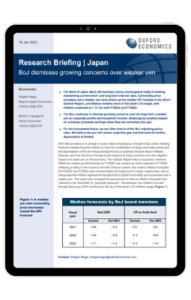Japan – BoJ dismisses growing concerns over weaker yen

The Bank of Japan (BoJ) left monetary policy unchanged at today’s meeting, maintaining current short- and long-term interest rates. Commodity price increases and a weaker yen have driven up the median CPI forecast in the BoJ’s Outlook Report, yet inflation remains short of the bank’s 2% target, with inflation projected at 1.1% for both FY2022 and FY2023.
What you will learn:
- We believe the impact of global commodity price increases on headline CPI will be transitory. Given the disinflationary effects of the lower mobile phone charges, we estimate annual headline CPI inflation will be far short of BoJ’s 2% inflation target in 2022 and 2023.
- We believe the BoJ will not adjust policy rates to stop the yen’s depreciation. Despite uncertainty over the prospects of US inflation and Federal Reserve policy, we think that there’s little room for further yen depreciation, as Fed rate hike expectations will be pared back at some point.
- We expect the BoJ will maintain its current policy rates, both for short- and long-term tenors, for years. In addition to the weak inflation outlook, low and stable long-term rates under the BoJ’s yield curve control policy will increasingly be indispensable for the government to keep a free hand in fiscal policy, even with little prospect of fiscal consolidation in the near future.
Tags:
Related research

Post
Nowcast shows wage growth slowing sharply
Our sentiment data, developed with Penta, suggests that UK private sector wage growth slowed sharply in March and early-April. If official data mirrors our sentiment indicator, it should keep the Monetary Policy Committee on track to cut interest rates in the summer.
Find Out More
Post
The euro and depreciation – shake, shake it off
Our new forecast assumes a slower euro appreciation against the dollar over the coming years than we previously anticipated. Relative productivity, terms of trade, and the current account will likely be less supportive of the euro than we thought. In addition, a stronger stock market than initially envisaged will attract more financial flows into the US than we had expected.
Find Out More